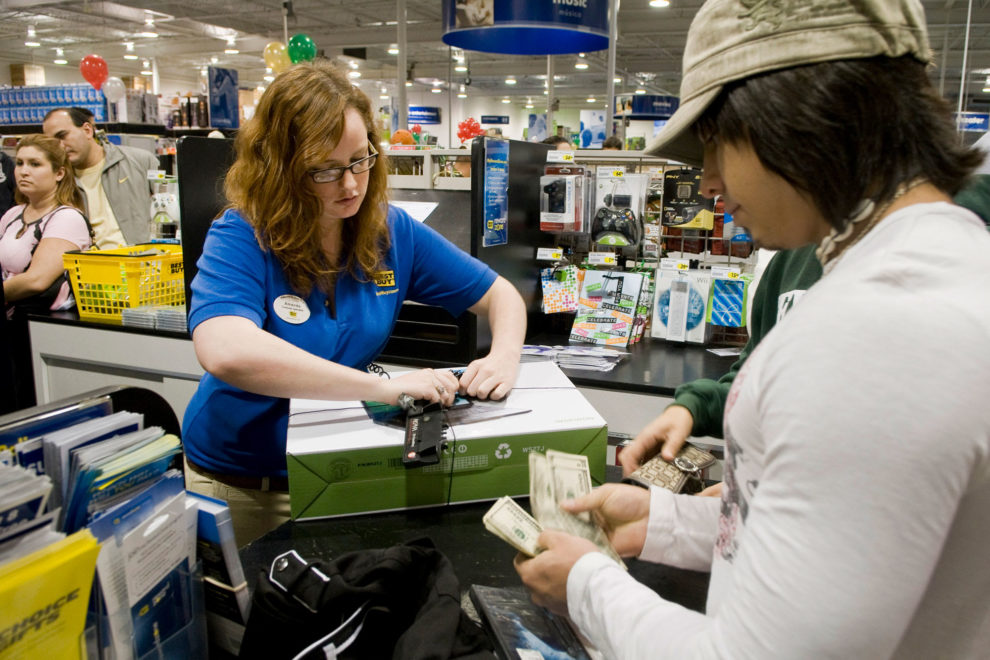
Best Buy CEO Corie Barry on Wednesday walked investors through the company’s plan to keep growing sales: By staying rooted in the consumer electronics category, while pushing further into in-home services like its Geek Squad network, and growing in health.
The investor meeting held in New York, Best Buy’s first in two years, was a chance for Barry, who took over the chief executive position in June, to lay out fresh five-year financial goals.
The electronics retailer is targeting $50 billion in revenue by fiscal 2025, and expects operating income over that time frame to accelerate to a 5% rate, compared with a growth rate of 4.6% in fiscal 2019. The company also said it plans to cut an additional $1 billion in costs over the next five years.
CFO Matt Bilunas said Best Buy should be able to achieve those cost cuts by minimizing the amount of items people return to stores, getting sharper at promotions and using more technology to automate tasks. He didn’t specifically say Best Buy would be eliminating jobs, but that the company would adapt to a “flexible workforce model.” The company said it doesn’t expect its store count will change “materially.”
Best Buy shares were down less than 1% by Wednesday afternoon. The stock, which is valued at $17.7 billion, has risen more than 27% this year.
A focus at Wednesday’s meeting was also Best Buy’s bigger push into health, particularly how the company aims to serve an aging population in the U.S.
The president of Best Buy’s Health division, Asheesh Saksena, said Best Buy aims to serve 5 million senior citizens over the next five years, up from 1 million today. Best Buy has boosted its presence in health through a handful of acquisitions including those of connected-health company GreatCall, elder-health technology company CST Technologies and wearable-sensors development company BioSensics.
“Best Buy seeks to address everyday needs. … And health is one of those eternal, everlasting human needs,” Saksena told the audience. He described the health-tech category as a $50 billion market.
For fiscal 2020, Best Buy is still targeting revenue to fall within a range of $43.1 billion to $43.6 billion.
The company previously called for fiscal 2020 earnings per share to fall between $5.60 and $5.75, excluding one-time items. Sales at stores open at least a year have been forecast to rise 0.7% to 1.7%.
Moody’s retail analyst Charlie O’Shea called Best Buy’s new financial targets “very attainable” and said they align with the firm’s “long-standing view that Best Buy will continue as one of the top performers in U.S. retail.”
“The core franchise remains on rock-solid footing, driven by … vendor relationships that are expanding and deepening, a store experience that clearly resonates with consumers, and a sensible extension strategy into segments such as health care,” O’Shea said in an emailed statement. “In addition, Best Buy’s conservative financial policy affords it the flexibility to invest if necessary to execute this growth plan.”
Analysts on average project Best Buy will earn between $5.60 and $5.86 per share this fiscal year, on sales of $43.39 billion, according to Refinitiv.
For the third and current quarter, analysts have been calling earnings per share of $1.03, on sales of $9.7 billion.
CEO Barry said in an interview with CNBC’s Courtney Reagan that Best Buy plans to “double down” on its growth strategy, despite “disruption” in the industry.
Barry also explained on Wednesday that Best Buy aims to grow its base of loyal shoppers that “love” the brand, who are spending 1.5-times as much as the average customer. Growing a “lease to own” option for purchases, and expanding next-day and same-day delivery are two things that should help Best Buy do that, she said.
Last month, Best Buy’s second quarter profits topped analysts’ expectations, but sales came up short. The company has been investing in its supply chain to speed up delivery ahead of the holiday season, which it hopes will set it apart from other competitors in the electronics space.
Best Buy has also been focused on growing partnerships with tech behemoths, including Amazon.












